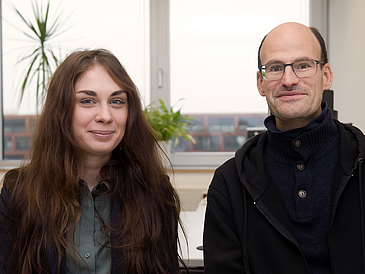In St. Petersburg, Daria Skibo carries out her research at the Centre for Independent Social Research. Russian civil society is her primary topic. The aforementioned institute is free from all old structures and scientists came together there “because we want to carry out real, self-organized social research,” says the 29-year-old. Her Bremen host, Professor Heiko Pleines, whose scientific specialization is the functioning and development paths of authoritarian regimes, adds: “They want to research freely and without burdens of the past.”
Classified
It becomes clear during the conversation with the guest from Russia that this particular scientific institute has been classified as a “foreign agent” by the Russian government. According to a 2012 law, this label can be given to all non-governmental organizations (NGOs) that are “politically active” – which can mean anything – and receive money from abroad. Retaliation is seemingly futile. “The special legal status comes with conditions, accountability and reporting obligations, constant checks,” states Professor Pleines. “A breach of the rules is thus quickly ascertainable. This results in high fines, the danger of closure, and in some cases incarceration.”
Absurd Footnote
Everyone who clicks on the website can see that the St. Petersburg institute carries out research on a variety of topics. They span from gender studies and environmental sociology to urban research. Yet, the following is still written clearly at the bottom of the page: “Based on the decision made by the Ministry of Justice of the Russian Federation, the autonomous, non-profit organization Centre for Independent Social Research (CISR) was entered onto the register of non-profit organizations that hold the function of a foreign agent.” Daria Skibo explains that the conditions do not clearly explain where this footnote must be – maybe also on business cards?
How Do German Foundations React?
There is not security and no guarantee. Instead, the Sword of Damocles hangs over the academic work. Daria Skibo appears undeterred. “I have a functioning network of friends and a good lawyer,” she says. After having spent a long period in Vienna and a stopover in Washington, Daria is happy to be in Bremen. She praises the excellent library of the Research Centre for East European Studies, her nice colleagues, and the scientific team. The topic that she wishes to drive forward in one year in Germany is closely connected to the “foreign agent” status. “I want to find out how German foundations, especially partisan foundations, cooperate with their Russian partners that have been classified in this way. What does this mean for their networks and the financial support?” In order to do this, she will hold several interviews, most of which will be in Berlin, but also in Bremen and other towns, during which she will clarify practical issues and suggest strategies for the Russian partners.
German Chancellor Fellowship for Tomorrow’s Leaders
For her stay in Bremen, Daria Skibo received the German Chancellor Fellowship for Tomorrow’s Leaders from the Humboldt Foundation. The fellowship is aimed at scientists that will take on leadership roles in the future. “I’ve been here since July so that I could take a look at the German alphabet,” she explains jokingly when asked about the first steps of her language acquisition. She previously travelled through the country and visited the media and companies together with 50 program participants from Brazil, China, India, Russia, and USA. After Daria had come to a seminar at the Klagenfurter Strasse and made first contacts in 2016, she had the idea that the Research Centre for East European Studies could be the ideal place for her scientific work. Now she is pleased that she can stay for a whole year.
Contact:
Prof. Dr. Heiko Pleines
Research Centre for East European Studies
University of Bremen
Phone: +49 421 218-69602
Email: pleines@uni-bremen.de

